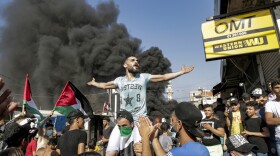
Lama Al-Arian
-
The military is conducting a credibility assessment of claims of civilian casualties during the U.S. operation against ISIS leader Abu Bakr al-Baghdadi.
-
"We are collecting from every person of goodwill," says a Roman Catholic priest who started a low-cost clinic. "We are not expecting a miracle. We hope to create a place where people feel respected."
-
In Iraq and Syria, the ISIS leader's death has stirred a mix of responses — from joy to disbelief to dread that the militants will rise again.
-
Protesters are demanding better public services, economic reform and a new government. Many demonstrators do so while holding a Lebanese flag in one hand and a beer in the other.
-
Two days into a cease-fire, clashes continue along Syria's northern border. Petraeus, who once commanded U.S. forces in the region, told NPR that withdrawing U.S. troops is unfair to Kurdish allies.
-
Here is what it was like in the northern part of the country as the Syrian military started advancing to retake territory after the U.S. made way for Turkey's incursion against the Kurdish forces.
-
The protests were spurred by the closure of two Palestinian-owned businesses amid a larger government crackdown on Syrian refugees. Palestinians make up about 10% of Lebanon's population.
-
Oman has emerged as a quiet facilitator of dialogue, including between Iran and the U.S. "We always keep a focus not on the negative, but on the positive," says Oman's incoming U.N. ambassador.
-
Lebanon requires refugees to live in shelters made of canvas or wood. A new military decree directs them to demolish concrete walls over 3 feet high by July 1. Many don't know where they'll live next.
-
The Tripoli office of the International Committee of the Red Cross says, "Densely populated residential areas are gradually turning into battlefields." The city has been under attack since April 4.










